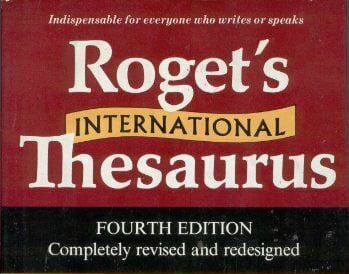In Mark Twain’s twenty quotes on writing, number nineteen states, “The difference between the right word and the almost right word is the difference between lightning and a lightning bug.” Every writer searching for that unique word has opened a thesaurus to pick a synonym. This right word says it better than the one first written. Before the internet, writers opened their small, red-bound Roget’s International Thesaurus searching for that best word.
Now, the online thesaurus is the go-to resource to find synonyms. While writers have many web applications to choose from, most are little more than a word list like Roget’s offered. The best applications provide resources that extend beyond a bucket of replacement terms. But what is Twain’s right word? The simple answer is the one that shows and not tells. For example, you might write, “The boy lazily walked along the…,” but consider this better choice, “The boy ambled, sauntered, or strolled along the….” Any of these three synonyms for “walked” removed the need for the adverb and built a better image in the reader’s mind with single word efficiency.
In addition, thesauruses help to eliminate the repeated use of the same word. In the first two paragraphs, I used “word” seven times. A better read demands a search for synonyms—a variety of terms—such as expression, phrase, tag, label, lexeme, item, and refrain; there are many replacements. In most sentences, context dictates the choice for a substitute. So, another requirement for an exemplary thesaurus is synonym suggestions categorized by the sentence context, a scene’s setting, or a story’s place.
A list of resources for the perfect thesaurus might look like this:
- A comprehensive list of synonyms and antonyms organized by context.
- A listing of words in the parts of speech they support: noun, pronoun, adjective, article, verb, adverb, preposition, conjunction, number, and interjection.
- A search that generates matches for single- and multi-word entries.
A single click that provides access to:
- An American and British English dictionary with contextual reference in all tenses.
- Antonyms.
- Acronyms.
- Rhyming words.
- A list of sentences using the synonym (with audio pronunciation).
- A translator for foreign languages.
- Idioms.
- An encyclopedia and Wikipedia.
- A word finder with a wide range of formatting filters.
Most writers use the thesaurus embedded in the writing software. Mac users have the Apple IOS native dictionary/thesaurus, and Windows users have Word’s built-in dictionary/thesaurus. These make synonym selection easy but provide few of the desired resources in the list.
The next option is an online version of traditional dictionaries, such as Collins, Merriam-Webster, and Cambridge. These are free with ads. Others have subscription fees and are ad-free. The online dictionaries offer greater functionality than the applications embedded in the writing software. Still, none deliver the range of benefits an author requires.
Three web applications satisfy most of the bulleted lines, so they should live in a bookmark folder on a writer’s computer desktop. The following links redirect to these applications:
- Resources in Thesaurus and in Dictionary puts these applications in third place on my most used list. I have both in my Thesaurus/Dictionary bookmark folder. Warning, the banner, sidebar, and pop-up screen blocking ads clutter the display.
- The Free Dictionary and The Free Thesaurus application resources make this applications second on my most used list and gives them a spot in my bookmark tab. Ads are present but less offensive.
- Word Hippo is in my Thesaurus/Dictionary bookmark folder. I use it most of the time. Ads are present but not distracting.
All three applications offer an ad-free look for a fee. This three-part blog series describes all the features of the Word Hippo and The Free Dictionary/Thesaurus. An inside look at these two applications will raise your writing to a higher level.
I’m always interested in my reader’s projects. What are you working on? Let me know here.
Leave me some feedback in a comment below and sign up for a short monthly newsletter so you never miss an informative post.






4 thoughts on “Thesauruses Aren’t Created Equal—Overview.”
Great to find a good thesaurus. Thanks.
Great to find a good thesaurus. Thanks.
Not every word in Hippo has multiple context suggestions. Why?
Good question. Some English words have a single meaning so they have just one context line in Hippo.